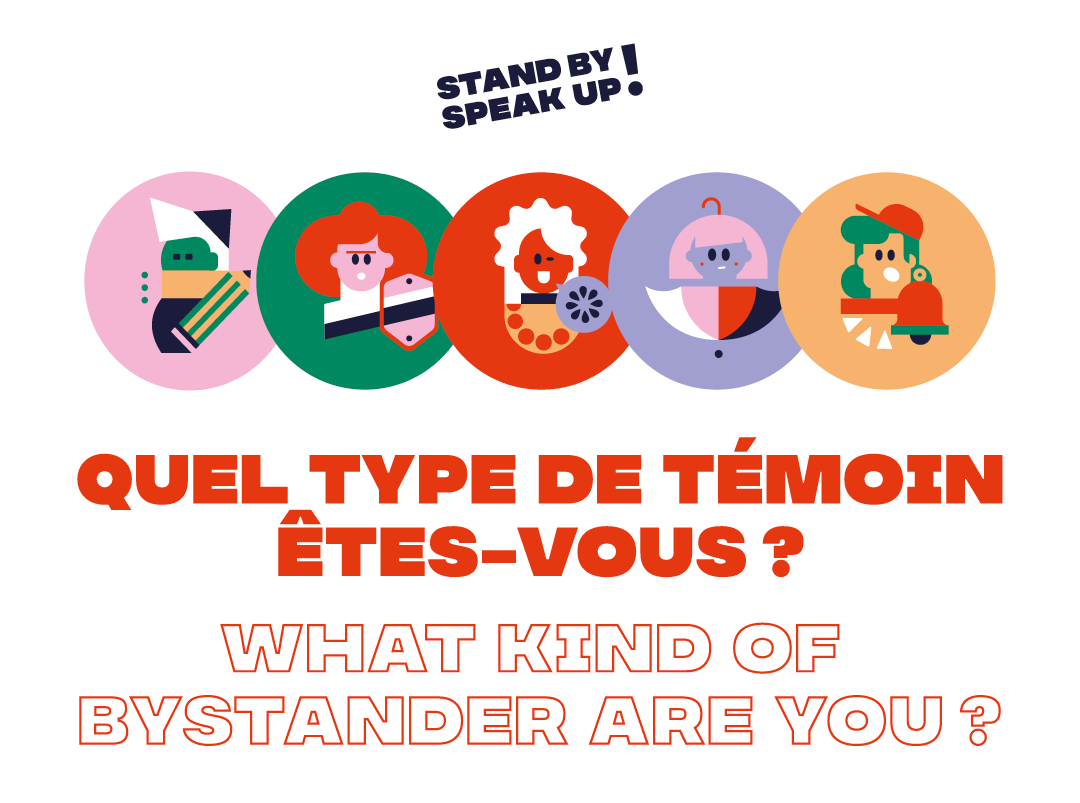Are you unsure about what’s happening to you? The persons of trust are available to help you put your situation into words.
You are a witness
Stand by speak up campaign
WHAT KIND OF BYSTANDER ARE YOU?
What should I do if I witness incivility, conflict, harassment or discrimination where I study or work?
That is a question which many UNIL members have been asking the Delegate for Work and Study Climate Protection since Help | UNIL was set up.
A multidimensional approach is needed to promote a healthy climate in which any infringement of personality rights receives a firm response. In particular, allies and witnesses can have a positive, rapid and tangible impact on interpersonal problems.
In order to help you react when you see a situation that doesn’t feel right, Help | UNIL is launching a new awareness campaign based on the 5D method*.
Find out what kind of bystander you are and what your potential power to act might be!
Because we have the power and responsibility to create individually and collectively a healthy work and study environment, each in our own way.
*Right to be, The 5Ds of Bystander Intervention, 2017
Speakup_Flyer_HQ.pdf (592 Ko)
Stand by Speak Up video
The 5Ds of Bystander intervention
If you witness sexism or harassment, here are few ideas inspired by the 5Ds of bystander intervention.

The direct witness
After assessing the situation, you feel safe enough to intervene : you name the problematic behaviour and step in between the victim and the source of the aggression or incivility.
Directly intervene: if you feel it is possible, intervene directly, for example by indicating your discomfort with the remarks. Be calm, but firm and clear.

The one who delegates
You feel someone must act and contact the people and resources available for help.
Delegate: you can ask for help from others around you, and suggest that they intervene. You can also refer the victim to the appropriate authorities by making yourself available as a witness in case a complaint is filed.

The one who delays
You turn to the victim after the event to offer a sympathetic ear and support.
Delay: if you couldn’t act at the moment of the incident, it is still time and important for you to do so after the facts. Once the incident is over, go and see the person concerned, ask them how they are feeling. This is very important because it allows the person to feel taken into account in their integrity.

The one who documents
Shy but attentive by nature, you believe in the importance of details and document all that could be useful.
Document: without intervening directly, you can note what you see and then share this testimony with the person concerned. You can also report the incident as a witness using the reporting form.

The one who distracts
Using humour and creativity, you know that a good distraction can cut the conflict short.
Distract: take an indirect approach to de-escalate the situation. Divert the attention of the perpetrator of the act in order to end the situation or allow the victim to walk away. If you can, reach out to the victim to ask them how they are feeling and offer support.
All members of the UNIL community are invited to:
- Adopt appropriate behaviours towards all other members of the university community and all external stakeholders;
- Respect each other's personal differences and limitations in work or study relationships;
- Contribute to establishing a serene work and study climate;
- Support those who may be the target of harassment (sexual or psychological), discrimination on the basis of gender identity, sexual or emotional orientation, or violence.

